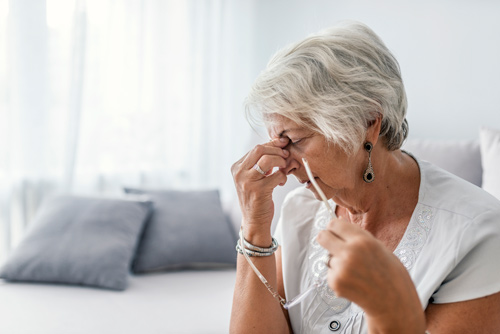
As people age, we are used to them becoming more forgetful and slowing down as their body and mind get older. While we might expect this as a natural part of aging, signs of Dementia and Alzheimer’s are never normal, nor should they be anticipated. Understanding these serious conditions can help us make better diagnoses and to provide the best care to those suffering and those close to them.
Alzheimer’s or Dementia, What’s the Difference?
These terms are often used interchangeably or together, but there is an important difference between Alzheimer’s and Dementia.
Dementia is a syndrome, which means that it is a collection of symptoms that often occur together, but is not a diagnosis. There are a lot of medical conditions that can lead to the group of symptoms called Dementia, and one of them is Alzheimer’s.
Dementia is the overarching syndrome, but Alzheimer’s is a condition that can frequently lead to Dementia symptoms. Alzheimer’s causes the accumulation of proteins in brain cells that damage transmission pathways, preventing connections and ultimately causing cell death and brain shrinkage. With the death of some brain cells and loss of these important connections, we begin to see signs of the brain struggling to maintain normal function.
Alzheimer’s and Dementia are different parts of the same discussion about the gradual loss of brain function. While they are most common in people over the age of 60, they can happen to anyone of any age.
What Do Dementia and Alzheimer’s Look Like?
It’s easy for the first early signs of brain deterioration to go unnoticed, such as mild forgetfulness or getting lost in familiar circumstances. Once Dementia and Alzheimer’s progress, though, they might have more noticeable symptoms like:
- Difficulty communicating
- Memory impairment
- Difficulty thinking clearly
Alzheimer’s specifically might show signs like:
- Depression
- Impaired judgement
- Confusion
- Disorientation
- Behavioral changes
- Difficulty speaking, swallowing, or walking (in late stages only)

Dealing With Alzheimer’s and Dementia
The medical community is still busy learning about these conditions, but they have a working understanding of parts of them and have developed treatment strategies to help manage their symptoms and progression as much as possible.
While there is no cure, people diagnosed with Dementia or Alzheimer’s can talk to their physician about medication options to help manage their memory loss, brain function, or depression. Your medical team may also suggest stimulating activities, like keeping social or learning new things, that will keep the brain in good health and prevent further deterioration.
Preventing further progression and damage from Alzheimer’s is important, not only to prevent symptoms from getting worse, but also to manage the risks of other illness and injuries, like stroke, from happening.
Dementia is usually not curable, but in many cases it can be managed with the right treatment plan.
Brain Health and Preventing Dementia and Alzheimer’s
Maintaining good brain health can be an important tool in managing or preventing the onset of dementia. Your brain is your most important organ and needs to be kept in good health along with the rest of your body. Following a healthy diet, exercising regularly, and engaging your brain in stimulating activity are crucial to keeping your mind and body healthy. Also, taking steps to protect your head by wearing helmets when needed and avoiding concussions can be important steps towards lifelong brain health.
There is still plenty for the medical community to learn about Dementia and Alzheimer’s, but they have made great strides in finding solutions to help their patient’s quality of life by improving their ability to function. It’s never too early or late to take control of your brain health and seek brain care solutions.